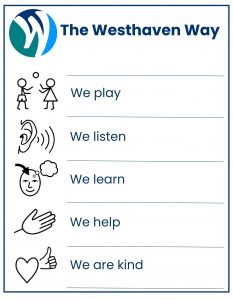At Westhaven, our 4 word intent for behaviour for learning is:
● Communication
● Reparation
● Understanding
● Celebration
We understand that children who attend our school have needs (which are the result of specific conditions such as ADHD, SCLN and ASC), which may affect their learning behaviour. Therefore, our approach to behaviour is flexible, child-centred and focussed on helping our learners to self-regulate so that they are able to learn and make progress academically, socially and emotionally.
Our approach is centred on the belief that behaviour is a form of communication and that by helping learners to feel safe, they can alter their learnt responses. By building positive, nurturing relationships we are able to help our learners develop the ability to enjoy reflective and empathic relationships with adults and peers. We also emphasise the importance of reparation to ensure these positive relationships are maintained following behaviour incidents. Some of our learners have histories of rejection and exclusion (including from previous schools / educational settings), therefore we use a combination of strategies to support, encourage and reward positive behaviour that is conducive to learning.
We value positivity, respect, perseverance and cooperation and are proud of our excellent staff – learners relationships. We strive to consistently acknowledge good behaviour and focus on the positives, to celebrate learners’ achievements, however small, and to treat every lesson and every day as a fresh start.






